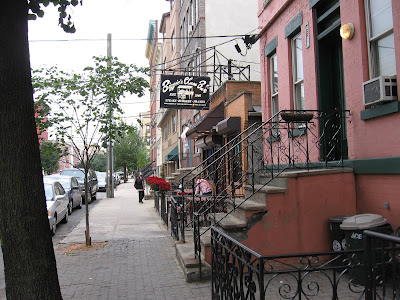 He was an extraordinary performer, a child prodigy grown to middle age, a transformative pop culture figure who died too young. Like most of us, he was compelled to examine his legacy, and Michael Jackson did it in public with This Is It, the farewell tour concert that he didn't complete. Luckily, there was 100 hours of footage of the rehearsals, and luckily for all of us that footage has been edited and put together into a riveting film that celebrates the life of the enigmatic genius that the eternal boy had become. We see him in rehearsal, holding back a little ("I have to conserve my voice..."), being coddled and revered ("Hold the rail, Michael!" as he's being introduced to the cherrypicker), being the exacting artist and director, and then, best of all, performing. There are charming notes as when they are discussing movements with him and he says, "That's the one the stewardesses do--I love that one, I absolutely love that one!", and that ride in the cherry-picker when he's carefully told, "This is the medium one, you'll be going much higher," and he responds quietly, "You know not to say that to me."
He was an extraordinary performer, a child prodigy grown to middle age, a transformative pop culture figure who died too young. Like most of us, he was compelled to examine his legacy, and Michael Jackson did it in public with This Is It, the farewell tour concert that he didn't complete. Luckily, there was 100 hours of footage of the rehearsals, and luckily for all of us that footage has been edited and put together into a riveting film that celebrates the life of the enigmatic genius that the eternal boy had become. We see him in rehearsal, holding back a little ("I have to conserve my voice..."), being coddled and revered ("Hold the rail, Michael!" as he's being introduced to the cherrypicker), being the exacting artist and director, and then, best of all, performing. There are charming notes as when they are discussing movements with him and he says, "That's the one the stewardesses do--I love that one, I absolutely love that one!", and that ride in the cherry-picker when he's carefully told, "This is the medium one, you'll be going much higher," and he responds quietly, "You know not to say that to me."In the film we see a magnificent performer, the consummate professional, working carefully to perfect the show that is never to be. There is something inherently tragic at the same time that the movie is triumphant: Michael Jackson onstage is all that he was ever portrayed to be, and more. He is gentle and tentative offstage as he is commanding, powerful and exciting onstage. I was in a theater with about 25 other people, scattered about all through the house, and there was spontaneous applause at many times during the show. Sometimes we made inadvertantant noises--groans, hoots, and sighs. I left the theatre behind two overweight young black women, and I heard one remark to the other, "I wish I had at least met him."
I actually did meet Michael Jackson once. It was after his Jackson Five days but years before Thriller. He sported a big Afro and wore a denim leisure suit. We were at a performance by The Dance Theatre of Harlem, and he was literally hanging back against a wall at intermission. I took the program over to him and he autographed it to my daughter. He spoke very softly and seemed almost embarrassed to be asked for his autograph. I am thrilled to think of that evening now, and to know that I still own that program.
It's hard to think of what the intervening years did to him, but there he is for all to see in This Is It, busting dance moves that he invented and that caused Fred Astaire to call him "the greatest dancer of the century." He was more than a phenomenon. He literally changed the world of dance and turned the world into dancers. He will never leave us, yet he left us cruelly too soon.
If you don't believe me, go see the movie.






